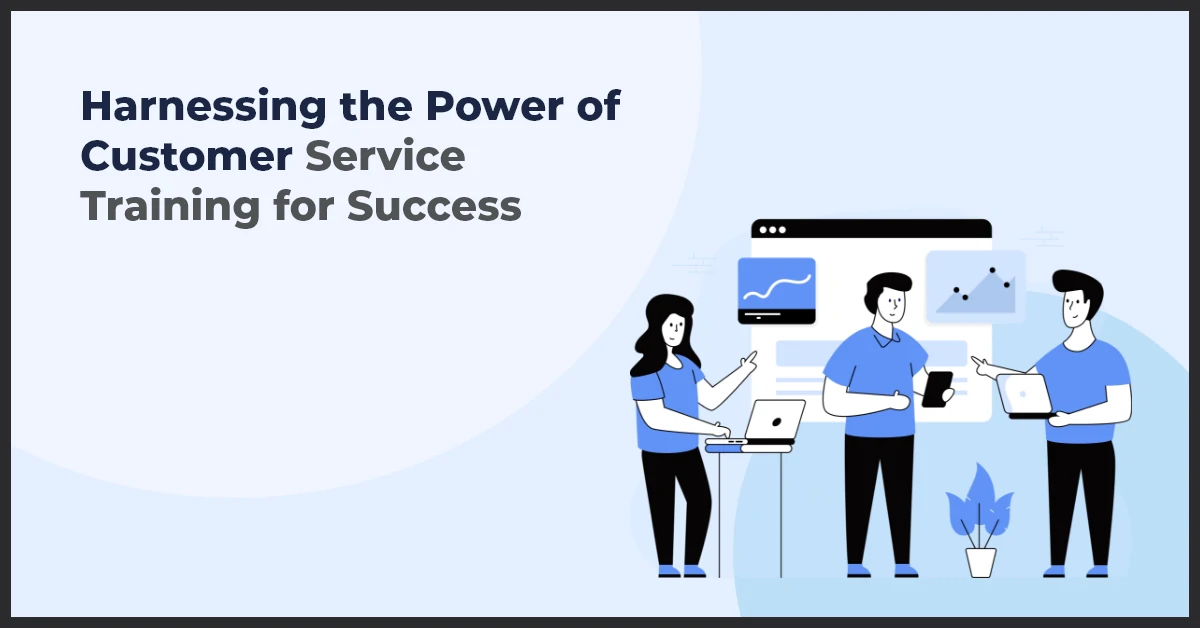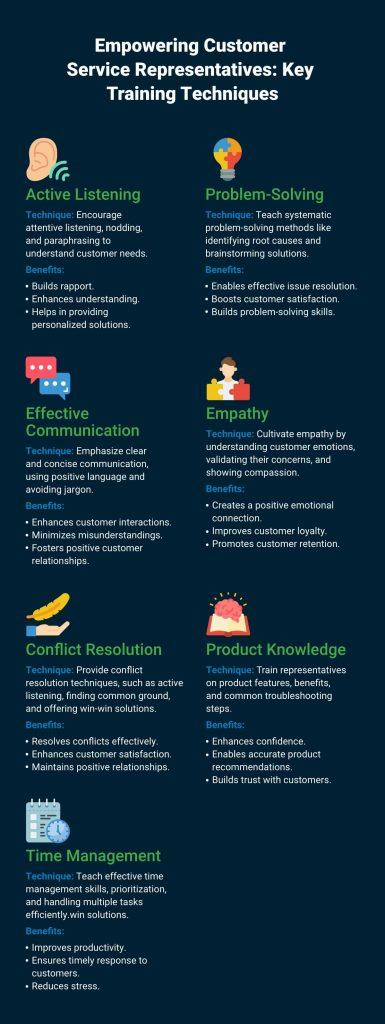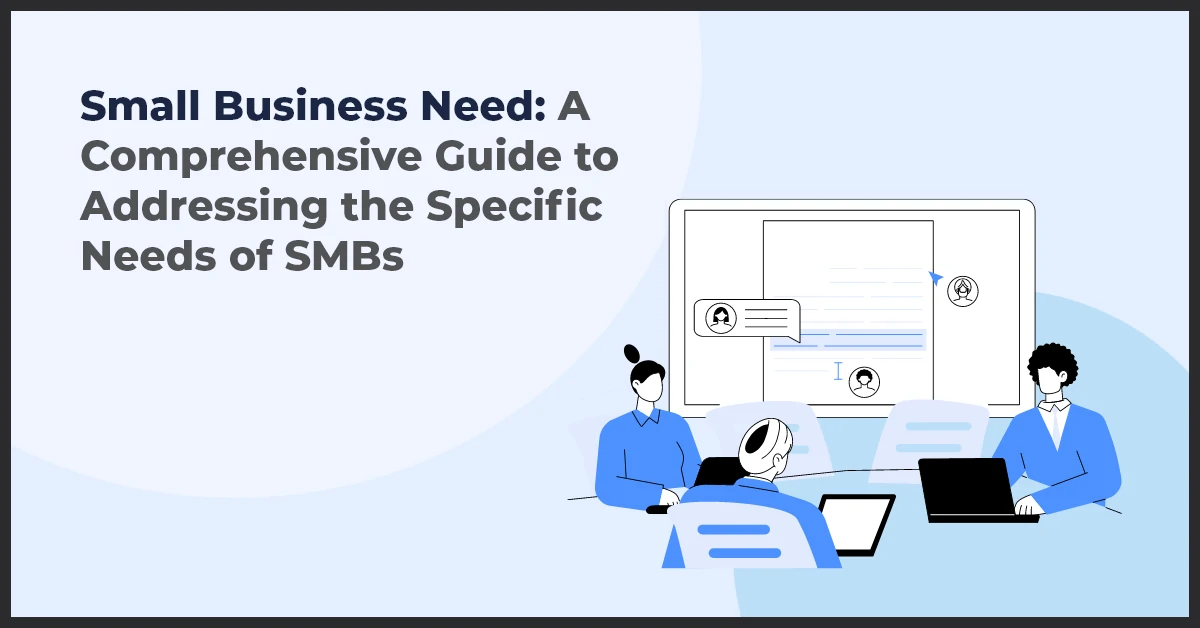Harnessing the Power of Customer Service Training for Success

Published on: May 25, 2023
Updated on: July 09, 2024
1043 Views
- Business
20 min read
Exceptional customer experiences are more important in today's fast-paced and fiercely competitive corporate environment. And guess what? The key to providing such exceptional experiences is effective training.
Think about it: when we contact businesses, we all desire exceptional assistance and individualized attention. We want to feel appreciated and cared for in addition to receiving excellent goods or services. To create such priceless moments, customer service training is crucial in this situation.
Companies that invest in customer service training provide their workers with the tools they need to interact with clients productively. It's not about responding to questions or complaints; it's about establishing a sincere connection, identifying problems, and forging connections.
Employees get problem-solving abilities, active listening skills, empathy development, and communication skills through training. These skills enable them to connect and comprehend clients on a deeper level. And as a consequence, they can provide above-and-beyond service that encourages steadfast client devotion.
In this blog, we're going to explore the best practices, strategies, and resources for customer service training. So, get ready to unlock the power of training and take your organization's customer service to new heights.
Understanding the Foundations of Customer Service Training
A. Defining Customer Service Training: Unleashing the Power of Purpose
When we talk about customer service training, it refers to a methodical and systematic process for giving staff members the abilities, information, and attitudes required to provide exceptional customer service. To consistently improve an employee's customer service skills, it extends beyond the initial onboarding procedure.
Providing workers with the skills they need to deliver excellent customer experiences and ensuring that their actions are in line with the organization's customer-centric goals are the two main goals of customer service training. Through training, employees learn how to handle a variety of circumstances professionally and acquire the capacity to solve problems successfully. They also receive a thorough awareness of what customers want from them.
Customer service training has many different goals. First and foremost, it seeks to raise customer satisfaction by giving staff the resources they need to provide unique and individualized encounters. Second, it emphasizes developing customer loyalty since happy consumers are more likely to return and recommend the company to others. Last but not least, customer service training helps the company's reputation and overall performance by fostering a favorable brand image that draws in new clients.
Organizations can build a solid basis for their training programs by outlining the goals and purposes of customer service training. This clarity helps staff members comprehend the significance of their part in providing great customer service and ensures that training activities are in line with the organization's larger aims.
B. The Importance of Training in Customer Relationship Management: Nurturing Strong Connections
Successful customer service is centered on customer relationship management (CRM). It entails establishing and sustaining trusting connections with clients, getting to know their wants and requirements, and offering tailored support. To cultivate and maintain these partnerships, training is essential.
Customer service representatives acquire the skills essential to managing client interactions successfully via thorough training. They get knowledge on how to interact with clients in a way that fosters long-term loyalty, rapport, and trust. Through training, they get the skills necessary to actively listen to clients, comprehend their issues, and offer solutions that are suited to their requirements.
Employees who have received customer relationship management training are also more equipped to handle difficult circumstances with professionalism and empathy. It equips students with methods for resolving disputes, dealing with challenging clients, and making bad situations better. Organizations that engage in training make sure that their customer service personnel are prepared to manage a variety of client encounters, building connections that go beyond simple business dealings.
C. Unleashing the Potential: Training Customer Service Skills
Effective Communication
The goal of effective communication training is to improve communication abilities so that professionals can express ideas effectively, actively listen to clients, and show empathy and understanding. Employees with effective communication skills can provide consumers with accurate information, offer the right solutions, and make them feel heard and appreciated.
Problem-Solving
Employees that receive problem-solving training are given the tools they need to assess problems, think critically, and come up with quick, workable solutions. client service representatives can address client concerns effectively, rectify problems quickly, and increase overall customer happiness by improving problem-solving abilities.
Empathy and Emotional Intelligence
Emphasis is placed on the value of emotional intelligence and empathy in customer service training. Training develops empathy so that employees can relate to and comprehend the feelings of clients, showing real concern and forging closer bonds. Employees that possess emotional intelligence are better able to handle difficult situations, placate irate clients, and provide great experiences.
Adaptability
Customer service representatives that receive quality training are equipped to meet a range of client demands and modify their approach as necessary. Because of their adaptability, they can customize their reactions and solutions for each client, offering individualized service and raising client happiness.
Product and Service Knowledge
Employees learn in-depth information about the company's offers, including its goods and services, features, and advantages. Because of their understanding, they can give consumers accurate and timely information that builds their confidence and trust in the company.
Best Practices for Customer Service Training
A. Customer Training: Best Practices and Strategies
It's crucial to train your customer service personnel and provide your clients with the information and abilities they need to succeed to deliver great customer care. To ensure product acceptance, customer happiness, and long-term success, customer training is essential. The following are some top practices and strategies:
Tailor Training to Customer Needs
Create training programs that specifically address the aims and difficulties of your clients by understanding their particular needs. To provide individualized training experiences, take into account their skill levels, existing knowledge, and preferred learning approaches.
Provide Comprehensive Onboarding
Create a systematic onboarding process that walks clients through the features and functions of your product or service. To make the transition easier, include interactive tutorials, walkthroughs, and documentation.
Offer Ongoing Training and Support
Customer success depends on ongoing learning. Regularly schedule webinars, training sessions, and other tools to aid consumers in understanding your product better and getting the most out of it. Provide specialized support channels where clients can access self-help materials and interact with other users, like a knowledge base or community forum.
Focus on Hands-On Learning
Encourage participation by including practical activities, role-playing, and examples from the real world in your training materials. Customers can practice using your product or service in a secure setting as a result, increasing their competence and self-assurance.
Measure and Evaluate Training Impact
Establish metrics to gauge the success of your customer training programs. Measure and evaluate the impact of the training you provide. Follow up on indicators like customer happiness, adoption rates, comments from customers, and success rates to spot areas that might use improvement and adjust your training courses appropriately.
B. Leveraging Technology: The Role of Customer Training Platforms
Utilizing technology is essential in the modern digital world to give scalable and efficient client training. Platforms for customer training provide a central location for controlling learner progress, hosting training resources, and supporting interactive learning. The advantages of using specialized platforms are as follows:
- Accessibility and Convenience: Training materials can be accessed on demand through customer training platforms, allowing users to take classes at their leisure and speed. They get unlimited access to training materials and can go back to them whenever they choose.
- Interactive Learning Experiences: To increase engagement and information retention, platforms frequently include multimedia components, interactive quizzes, and gamification features. The learning process is more pleasurable and efficient because of this involvement.
- Progress Tracking and Reporting: Customer training platforms provide you the ability to track client progress, keep an eye on completion rates, and produce reports on learner performance. This information reveals areas of strength and those that need more assistance.
- Scalability and Consistency: A training platform guarantees that you can scale your training efforts without sacrificing quality as your client base expands. It makes sure that training materials are delivered consistently and makes it simple to change information as necessary.
| Type of Training | Benefits | HubSpot Integration |
| Onboarding training | Helps new customers get up and running with your product or service. | HubSpot onboarding training can help your new customers learn how to use HubSpot to manage their customer relationships. |
| Upsell and cross-sell training | Helps existing customers learn about other products or services that you offer that could be of interest to them. | HubSpot upsell and cross-sell training can help your sales team identify opportunities to sell additional products or services to your existing customers. |
| Customer support training | Helps customer support representatives answer customer questions and resolve issues quickly and efficiently. | HubSpot customer support training can help your customer support team use HubSpot to manage customer inquiries and resolve issues. |
| Sales training | Helps sales representatives close more deals. | HubSpot sales training can help your sales team use HubSpot to identify and qualify leads, close deals, and manage customer relationships. |
| Marketing training | Helps marketing professionals create and execute effective marketing campaigns. | HubSpot marketing training that can help your marketing team use HubSpot to create and manage marketing campaigns, track results, and measure ROI. |
Note- The pricing for HubSpot's training may vary depending on the specific subscription plan and additional services chosen.
C. Elevating Customer Service with HubSpot's Training Solutions
Comprehensive customer training solutions are available from HubSpot Marketing Automation platform, a top customer relationship management (CRM) and marketing automation platform. Their site offers a variety of resources, including training programs, credentials, manuals, and an active user base. The following are some advantages of using HubSpot's training options:
- Extensive Course Catalog: An extensive selection of courses are available from HubSpot, including those on inbound marketing, sales, customer care, and CRM implementation. These programs are made to give both clients and staff the abilities they need to succeed.
- Interactive Learning Experience: To provide a fun and dynamic learning environment, HubSpot's training platform includes interactive components, hands-on activities, and real-world examples. This method aids students in successfully applying their information.
- Credentials and Certificates: HubSpot offers certificates that attest to a person's proficiency in fields including inbound marketing, sales, and customer support. These certifications can increase professional credibility and show a dedication to lifelong learning.
- Community Support: HubSpot's training programs provide a friendly learning environment where users can exchange expertise, get guidance, and work with other professionals in their field. This community-driven strategy offers possibilities for continual learning and networking.
You can use HubSpot's resources and experience to boost your customer service talents and promote customer success by adding their training solutions to your customer service training program.
Nurturing Customer Service Excellence Through Training
A. The Journey to Excellence: Training in Customer Service

Assessing Current State
The first stage is to evaluate how your customer service procedures stand at the moment. By examining client feedback, doing internal reviews, and comparing against industry norms, you can pinpoint your strengths and potential development areas. This evaluation serves as a starting point for creating customized training plans.
Defining Service Standards
Clearly defining your intended service standards and expectations is important. This includes creating standards for service quality, response times, and communication procedures. Training programs should be in line with these criteria to guarantee that staff members are aware of and capable of providing the necessary quality of service.
Designing Training Programs
Create thorough training programs that cater to specific skill development requirements based on the gaps and service standards that have been discovered. To develop compelling learning experiences, combine a range of training techniques, including classroom instruction, e-learning modules, role-playing activities, and real-world case studies.
Role-Specific Training
Recognize that certain positions on your customer support staff can need specialized training. Whether they are front-line reps, supervisors, or managers, training programs should be tailored to address the particular problems and obligations of each job. Employers are given the tools they need to succeed in their particular roles thanks to this focused approach.
Continuous Learning and Improvement
Excellence in customer service requires constant learning and improvement. By regularly offering training opportunities, review sessions, and skill-enhancement chances, you can promote a culture of continual learning and progress. Encourage a culture where staff members feel free to give criticism, make suggestions for changes, and take an active role in their professional growth.
B. Training Customer Service Representatives for Success

Product and Service Knowledge
Ensure that Customer Service Representatives are well-versed in Your Products and Services. Along with the features and advantages, training should go through potential problems and commonly asked concerns. Representatives are better equipped to respond to consumer inquiries and give correct information and recommendations because of this expertise.
Active Listening and Communication Skills
Customer service employees need to have active listening and communication skills to be effective. Training should emphasize ways to listen intently, ask clarifying questions, and speak clearly and concisely. Stress the value of showing empathy and being upbeat during all customer encounters.
Decision-Making and Problem-Solving
Give employees the decision-making and problem-solving abilities they need to address a range of consumer concerns. They should learn through training how to assess events, obtain pertinent data, and consider viable solutions. To foster the development of their critical thinking skills, provide them with applicable tasks and case studies.
Conflict Resolution and De-Escalation
Customer service workers should receive training in handling difficult situations and demanding customers. Conflict resolution and de-escalation. The instruction should include strategies for handling emotions, de-escalation, and conflict. Role-playing games can be very useful for imitating real-world events and educating representatives on how to handle them professionally and empathetically.
C. Enhancing Customer Service Culture: Training for Employee Engagement

Alignment with Organizational Values
Training initiatives should place a strong emphasis on the guiding principles of the company and how they apply to customer service. Employees are made aware of how their activities affect the overall customer experience and organizational performance by tying training material to these principles.
Employee Empowerment
Training equips staff members with the skills, information, and assurance necessary to perform great customer service. Employees become more involved and take responsibility for their part in achieving customer satisfaction when they feel empowered and prepared to handle client encounters.
Recognition and Rewards
Recognize great customer service performance by implementing systems of recognition and rewards. Employees are encouraged to continually go above and beyond in their encounters with customers by highlighting instances of excellent customer service and offering rewards for attaining service excellence.
Leadership Support
Organizational leaders must actively participate in and support effective training. Managers and supervisors have to take part in training initiatives and provide an excellent example. Their dedication to providing exceptional customer service sets the standard for the whole team and emphasizes the value of continual training and development.
Addressing Challenges and Difficult Customers
A. Dealing with Difficult Customers: Strategies and Training Methods
Active Listening and Empathy: Teach employees to actively hear clients' complaints, feel their annoyance, and respect their feelings. This tactic promotes rapport-building, exhibits sincere understanding, and displays a readiness to resolve the situation.
Remaining Calm and Professional: Encourage employees to behave professionally and with composure even when dealing with challenging clients. Techniques for maintaining composure under duress, controlling emotions, and responding deliberately rather than impulsively should be included in the training.
Effective Communication: Give reps the tools they need to negotiate challenging interactions. This entails speaking plainly and concisely, refraining from employing jargon and changing communication methods to suit the requirements of various clients. De-escalation strategies for calming stressful situations should be covered in training as well.
Problem-Solving and Conflict Resolution: Provide instruction in problem-solving methods to aid representatives in locating the source of an issue, coming up with solutions, and cooperating with clients to find solutions. Negotiation and compromise are two conflict resolution techniques that can help settle conflicts and arrive at solutions that benefit both parties.
Escalation and Support Channels: Teach reps when and how to escalate concerns to higher-level management or support channels. Training should include instructions on how to get help when confronted with complicated or tense circumstances, ensuring that staff members are aware of how to use the right tools to properly handle customer complaints.
B. The Power of Customer Experience Training
Differentiation and Competitive Advantage
Superior customer experiences differentiate your business from competitors and provide you with a competitive edge. You can provide great service, foster client loyalty, and get a competitive edge in the market by investing in customer experience training.
Customer Satisfaction and Loyalty
Employees who have received training that stresses the value of the customer experience are better able to comprehend how their interactions with customers affect their satisfaction and loyalty. You can encourage long-term client connections and advocacy by offering consistent and exceptional experiences.
Word-of-Mouth and Brand Reputation
A good brand reputation is a result of positive word-of-mouth recommendations that come from satisfied customers. Representatives who have received customer experience training are better able to generate memorable experiences that clients are more inclined to recommend to others.
Retention and Revenue Growth
Customer retention rates are better when customers are happy and loyal since they are more likely to remain with your company and generate additional revenue. Additionally, happy consumers often make larger purchases, which boosts sales and profitability.
C. Unleashing the Power of Training: Resolving Angry Customer Situations
Emotional Intelligence and Empathy
Teach employees how to detect and control their own emotions as well as comprehend and empathize with those of irate clients. This facilitates the development of a peaceful and encouraging environment for issue-solving.
Active Listening and Validation
Be sure to emphasize the value of actively listening to the problems of irate consumers. Customers should believe that their concerns will be immediately resolved, and representatives should affirm their sentiments and show understanding.
Apology and Accountability
Teach employees to honestly apologize on behalf of the company and accept responsibility for any errors or shortfalls. Guidelines on how to provide suitable solutions or compensation, when necessary, should also be included in the training.
Problem Resolution and Follow-up
Give reps tools for addressing problems so they can find answers and act right away to solve the issue. Establishing follow-up processes will help to guarantee that the issue is entirely fixed and the customer's pleasure is restored.
Resources for Effective Customer Service Training
A. Recommended Training Materials and Resources
To enhance your customer service training initiatives, various materials, and resources are available that provide valuable insights and practical strategies. Consider incorporating the following resources into your training programs:
Books:
- "Delivering Happiness: A Path to Profits, Passion, and Purpose" by Tony Hsieh
- "The Effortless Experience: Conquering the New Battleground for Customer Loyalty" by Matthew Dixon, Nick Toman, and Rick DeLisi
- "Customer Satisfaction Is Worthless, Customer Loyalty Is Priceless" by Jeffrey Gitomer
| Resource Title | Description | Rating |
| Book: "Delivering Happiness" | Tony Hsieh shares insights on creating a customer-focused culture and exceptional experiences. | 4.6 |
| Video: TED Talk - "The Power of Moments" | Chip Heath and Dan Heath explore how creating memorable moments enhances the customer experience. | 4.5 |
| Course: Customer Service Fundamentals | LinkedIn Learning course covering essential customer service skills and strategies. | 4.5 |
Videos and Webinars:
- TED Talks: Explore TED Talks related to customer service and customer experience, such as "The Power of Moments" by Chip Heath and Dan Heath or "How to Use Others' Feedback to Learn and Grow" by Sheila Heen.
- Online Webinars: Many organizations and industry experts offer webinars on customer service training topics. Look for reputable providers that offer insightful content and practical tips.
Online Courses and Training Programs:
- Customer Service Fundamentals by LinkedIn Learning: This comprehensive course covers essential customer service skills and strategies.
- Customer Success Manager Certification by Customer Success Association: Ideal for those in customer success roles, this certification program provides in-depth training on managing customer relationships and driving success.
- Customer Service Excellence by HubSpot Academy: HubSpot offers free online courses that focus on delivering exceptional customer service and building customer loyalty.
B. The Best Customer Service Training Programs and Companies
Dale Carnegie Training: Dale Carnegie provides a variety of customer service training programs aimed at strengthening customer interactions, developing effective communication skills, and fostering a customer-centric mentality.
Ritz-Carlton Leadership Center: Known for its exemplary customer service, the Ritz-Carlton Leadership Center offers training courses that show businesses how to give remarkable experiences, forge enduring bonds with their clients, and foster a culture of excellence in customer service.
Growth Natives: Growth Natives offers customer service training programs to enhance interactions, communication skills, and customer-centricity. Customer service training helps to improve satisfaction, reduce churn, and enhance morale, productivity, and reputation. Training programs include onboarding, customer service, problem-solving, and communication training.
C. The Role of Learning Management Systems (LMS) in Customer Training
Customer service training activities must be planned, carried out, and tracked with the use of learning management systems (LMS). LMS platforms provide several features and advantages for client training:
Centralized Content Management: LMS solutions give you the ability to integrate all of your training resources, such as courses, videos, and exams. As a result, managing and updating material is made simpler.
Customization and Personalization: LMS solutions allow for the personalization of training materials to meet the unique requirements of your company. Training is more successful when learners can go at their speed thanks to personalization possibilities.
Tracking and Reporting: LMS solutions offer strong monitoring and reporting features that enable you to keep track of learners' advancement, completion rates, and test results. This information aids in evaluating the success of your training initiatives and pinpointing areas for development.
Gamification and Interactive Features: Quizzes, badges, and leaderboards are just a few examples of the interactive and gamification features that are available on many LMS platforms. These components boost participation and encourage students to get involved in their training.
Scalability and Accessibility: LMS platforms offer flexibility in how training materials are delivered. Students can use a variety of devices to access training materials at any time and anywhere. LMS solutions can also readily scale to meet the needs of a rising client base or growing training requirements.
Take into account elements like user-friendliness, integration potential, and customer support when choosing an LMS platform for customer training.
You can maximize your customer service training activities and equip your staff to provide excellent client experiences by employing these resources, collaborating with well-known training programs and businesses, and utilizing the benefits of an LMS platform.
Conclusion
Customer service training plays a vital role in shaping the success of businesses in today's highly competitive market. By emphasizing the significance of training, organizations can ensure exceptional customer experiences that lead to customer satisfaction and loyalty.
Investing in customer service training enables businesses to unlock the potential of their teams. By developing essential skills and fostering a customer-centric culture, employees are empowered to deliver exceptional service at every touchpoint.
To embark on this journey of growth and excellence, reach out to us at info@growthnatives.com or call +1 855-693-4769. Our team of experts is ready to assist you in designing and implementing effective customer service training programs tailored to your organization's needs.
Don't underestimate the power of training in transforming your customer service and driving business success. Start investing in your team's development today and reap the rewards of satisfied customers and a thriving business.
Sources
https://www.freepik.com/free-vector/original-hand-drawn-leadership-composition_3292888
https://www.freepik.com/free-vector/organic-flat-people-business-training-illustration_13379608
https://www.amazon.com/Delivering-Happiness-Profits-Passion-Purpose/dp/0446576220
https://www.amazon.com/Effortless-Experience-Conquering-Battleground-Customer/dp/1591845815
https://www.amazon.com/Customer-Satisfaction-Worthless-Loyalty-Priceless/dp/188516730X



